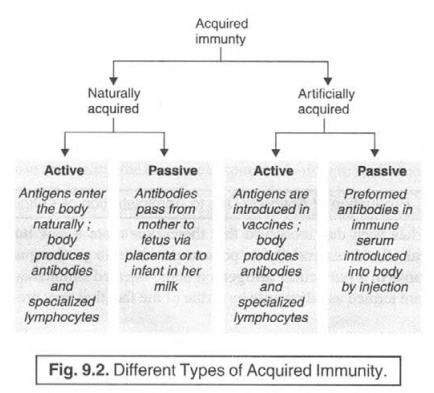Types of Specific Immunity
| Home | | Pharmaceutical Microbiology | | Pharmaceutical Microbiology |Chapter: Pharmaceutical Microbiology : Immune Systems
Following are the various types of specific immunity that would be discussed briefly in the sections that follows :
TYPES OF SPECIFIC IMMUNITY
Following are the various types of
specific immunity that would be discussed briefly in the sections that follows
:
1. Acquired Immunity
Acquired immunity usually results from the development of active or passive immunity, as opposed to either natural or innate immunity.

In other
words, acquired immunity invariably
refers to the ‘protection’ an animal
inherently develops against certain types of microorganisms or foreign
substances. In reality, the acquired
immu-nity gets developed in the course of an individual’s lifespan. Fig. 9.2 depicts the different types of acquired immunity in a summarized
form.
2. Active Immunity
Active immunity refers to the specific immunity
obtained from the development within the body of antibodies or sensitized T lymphocytes (T Cells)
which critically neutralize or destroy the infective agent. It may eventually
result from the immune response to
an invading organism or from inoculation with a vaccine essentially containing
a foreign antigen.
3. Cell-Mediated Immunity [or T-cell Mediated Immunity]
It has
been duly observed that the regulatory
and cytotoxic actions of T cells during the specific immune response is
known as the cell-mediated immunity. However,
the entire process essentially needs
almost 36 hr to accomplish its full effect. It is also called as T cell mediated immunity.
Physiological Actions : Interestingly,
unlike B cells, T cells invariably fail to recognize the so called foreign antigens
on their own. A foreign antigen is
duly recognized by a macrophage
which engulfs it and displays part of the antigen on its surface next to a histocompatibility or ‘self’ antigen (macrophage processing).
Finally, the presence of these two markers together with the secretion of a cytokine, interleukin-1 (IL-1) by
macrophages and other antigen-presenting cells duly activates CD4+/ CD8 T cells (i.e., helper T cells), that categorically modulate the activities
of other cells adequately involved in the immune
response.
Thus, the
CD4+T cells secrete interleukin-2 (IL-2), that stimulates
the activity of natural killer cells (NK cells), cytotoxic T cells, and B cells ; and ultimately promotes the
proliferation of CD+T cells in order
that the invading pathogen may be destroyed or neutralized effectively.
Besides, Gamma Interferon secreted by CD+T
cells increases distinctly the
macrophage cytotoxicity and antigen
processing. However, the T-cell
mediated immunity plays a significant and pivotal role in the rejec-tion of transplanted tissues and
in ‘tests for allergens’ i.e., the delayed hypersensitivity reaction.
4. Congenital Immunity
The congenital immunity refers to the
immunity critically present at birth. It may be either natural or acquired, the
latter predominantly depends upon the antibodies solely received from the
mother’s blood.
5. Herd Immunity
The herd immunity represents the immune protection duly accomplished via vaccination of a portion of a
population, that may eventually minimise the spread of a disease by restricting
the number of potential hosts for the respective pathogen.
6. Humoral Immunity [or B-cell Mediated Immunity]
Humoral immunity respresents the immunity duly
mediated by antibodies in body fluids e.g., plasma or lymph. As these antibodies are adequately synthesized
and subsequently secreted by B cells, that
protect the body against the infection
or the reinfection by common
organisms, such as : streptococci
and staphylococci, it is also known
as B-cell mediated immunity. In
reality, the B cells are stimulated
by direct contact with a foreign antigen and differentiate into the plasma cells that yield antibodies
against the antigen ; and the corresponding memory cells which enable the body to rapidly produce these
antibodies if the same antigen appears at a later time.
It is,
however, pertinent to state here that B
cell differentiation is also stimulated duly by interleukin-2 (IL-2), secreted
by the T4 cells, and by foreign
antigens processed by macrophages.
7. Local Immunity
Local immunity is usually limited to a given
area or tissue of the body.
8. Natural Immunity
Natural immunity refers to the immunity programmed
in the DNA, and is also known as the
genetic immunity. It has been observed that there are certain pathogens
that fail to infect some species due
to the fact that the cells are not exposed to appropriate environments, for
instance : the ‘measles virus’ cannot reproduce in the canine
cells ; and, therefore, dogs do have
natural immunity to measles.
9. Passive Immunity
Passive immunity specifically refers to the
immunity acquired by the introduction of
preformed antibodies into an unprotected individual. It may take place
either through injection or in utero from
antibodies that usually pass from the mother to the foetus via the placenta. It can also be
acquired by the newborn by ingesting the mother’s milk.
Related Topics
